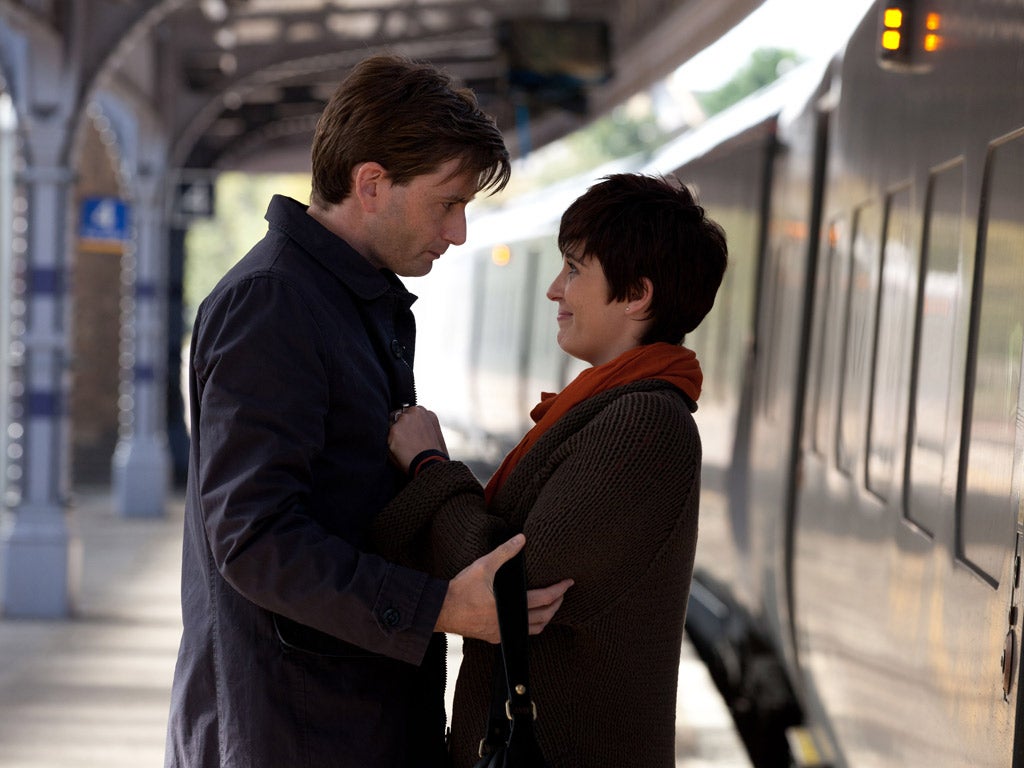True Love, BBC1, Sunday to Wednesday Playhouse Presents Psychobitches, Sky Arts 1, Thursday
A series of plays about love was let down by its USP – that the actors improvise their dialogue

When Whose Line is it Anyway? appeared on our TV screens in 1988, it was a revelation. Our first sighting of improvisational comedy! It was so fast, so clever, so giddyingly creative. We (mostly) marvelled at the snap of the extempore dialogue, the speed at which brain engaged ear and mouth simultaneously, hearing a line and whacking back a brilliant return. Last week, BBC1 tried to do something similar with straight drama in True Love.
Dominic Savage, the Bafta-winning writer of Nice Girl and Freefall, offered five, improvised half-hour plays. They had no scripts as such, only story outlines and suggestions about how characters were supposed to develop. It was left to the actors to invent their lines – and left them looking dangerously exposed.
The plays explored themes of love. They weren't exactly romantic. They dealt, respectively, with Inconvenient Old Flame Turning Up Looking For a Shag Love, Con-Artist Blonde Spotted at the Bus Stop Love, Bored Housewife Liberated by Walks With Nice Turkish Bloke Love, Out-of-the-Blue Lesbian Schoolgirl Love and, in a triumphant, double-dose finale, Online Dating Love Threatened By Deranged Infatuation from Foxy Jailbait.
You could tell that Savage (who also directed) couldn't rely on his actors' improvised verbal sparkle to carry the playlets. Despite the top acting talent – David Tennant, Ashley Walters, Billie Piper, Jane Horrocks, David Morrissey – the lines they invented were interchanges of the "Are you OK?"/"Yeah I'm fine"/ "What's the matter with you?" kind – familiar and authentic to us all, God knows, but dramatically inert.
To help things along, Savage employed an arsenal of effects, chief of which was music. "What the World Needs Now is Love Sweet Love" accompanied the credits to each play – ironically, given that, in most cases, love was a disruptive, wrenching, needy visitor that played havoc with the uncertain stability of marriage. "The First Time (ever I saw your face)" bellowed on the soundtrack as David Tennant struggled to resist the attraction of his old flame. "True Colours" nudged at Billie Piper as she discovered her capacity to love one of her schoolgirl charges (why didn't they play "Girls Just Wanna Have Fun" and have done with it?).
There was a lot going on, though. Savage has a fine eye for composition: his native Margate yielded beautiful images of tides and sunsets, crashing waves and solitary strands. Trains featured thematically, as images of escape or deliverance, in four of these five brief encounters. Characters from one drama turned up in others, but to little effect. What was missing was, I'm afraid, expository dialogue. We needed to hear the first-meeting conversation between David Morrissey and his online inamorata. We'd have liked some who-the-hell-are-you chat between Ashley Walters and his bus-stop vamp. Savage gave us only seagulls and jazz. It wasn't enough.
Sky Arts 1, by contrast, employed six writers (five of them men) to provide funny lines for leading funny women in Playhouse Presents Psychobitches. No improvisation was required, but the results were equally patchy. The central conceit was that a succession of famous women from history subject themselves to the enquiries of a shrink, played with cooing aplomb by Rebecca Front. Joan of Arc is shown to be a petulant teen in a breastplate who justifies herself by saying "God made me do it", Eva Braun lists the virtues of her new boyfriend ("When he walks into a room, everyone really respects him") before confiding, "He might be a bit of a racist", and Beatrix Potter reveals that animals tell her mucky stories.
I laughed immoderately at Sharon Horgan's portrayal of Frida Kahlo with a long droopy moustache, blithely ignoring the shrink's subtle enquiries ("Is it possible that you've ... cultivated something that might be keeping him at arm's length?") and at Sheila Reid doing Mother Teresa as a chain-smoking Northern harridan. But the humour relied tiresomely on the juxtaposition of primness and smut, on Jane Austen and blowjobs, the Bible and bonking. In one sketch, Mary Whitehouse reveals a liking for gay porn. Mary Whitehouse? Which decade are we in now? At times I wished the women had been invited to improvise. They might have brought some welcome diversion from the writers' one-track minds.
Join our commenting forum
Join thought-provoking conversations, follow other Independent readers and see their replies
Comments